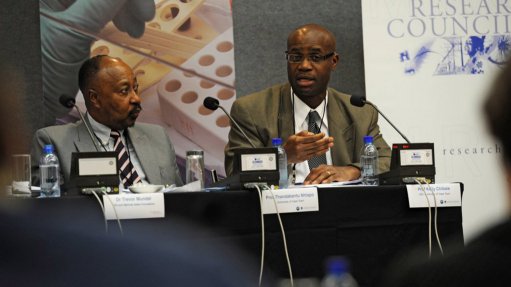
South African researchers committed to developing vaccines and new medicines and biotechnologies to tackle malaria, tuberculosis (TB) and HIV/Aids have received a boost with a R370-million partnership through the Bill and Melinda Gates Foundation (BMGF).
The BMGF says it is funding innovative, African-led research at the Medical Research Council (MRC) and the University of Cape Town’s Drug Discovery and Development Centre, H3-D.
“South Africa has world-class researchers and the infrastructure necessary to develop the kinds of innovative health solutions needed to accelerate progress [in the fight] against TB, HIV, malaria and other infectious diseases,” said BMGF Global Health Programme president Trevor Mundel at the announcement in Cape Town late last month.
H3-D is to receive R55-million from the BMGF over a five-year period. The cutting- edge centre, in collaboration with the Medicines for Malaria Venture, recently announced the discovery of a novel chemical compound which has the potential to impact on both the control and eradication of malaria.
The MRC is to receive about R125-million from the BMGF for its Strategic Health Innovation Partnership (SHIP) unit to lead and fund world-class research aimed at developing Aids and TB vaccines.
“The MRC’s initiative to create the SHIP gives South African scientists a unique opportunity to lead the process of developing new technologies to improve health,” said MRC president Professor Salim Abdool Karim.
South African scientists have been proving themselves on the global stage. The malaria compound has garnered international interest. Testing will begin at Grootte Schuur Hospital, in Cape Town, within the next few months. The drug will be given to healthy volunteers.
H3-D founder and director Professor Kelly Chibale said the ability to test the drug in clinical trials was a significant leap.
“It’s extremely important that research is happening in Africa led by Africans. People don’t think of Africa as a source of innovation. But we need to change this. We’ve shown that we can discover drugs, develop them and test them in the system.”
H3-D is steeped in research into HIV/Aids, TB and malaria, while the SHIP intends to fund six to ten projects in the vaccine space.
“Within five years, the SHIP will have a bigger budget than the rest of the MRC,” said Karim, adding that research into infectious diseases needed big money.
“You can’t get moving in development with piddling amounts of money. You need muscle. If we want to develop even one product, we need hundreds of millions of rands to see it through to completion,” said Karim.
The two partnerships have been backed by the departments of Science and Technology and Health.
South Africa has the highest incidence of TB in the world, with 400 000 new smear-positive TB cases recorded every year, while HIV remains a problem.
“We have made great strides [in combating] HIV, but we still have a lot of new infections,” said Yogan Pillay, the deputy director- general for HIV/Aids and TB in the national Department of Health.